Unit 2 How often do you exercise?Section B 词汇讲解课件(共25张PPT)
文档属性
| 名称 | Unit 2 How often do you exercise?Section B 词汇讲解课件(共25张PPT) |
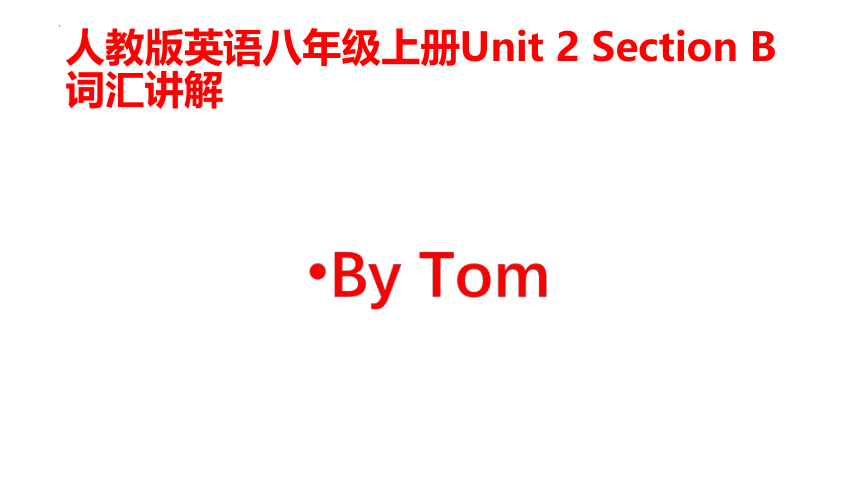
|
|
| 格式 | zip | ||
| 文件大小 | 96.3KB | ||
| 资源类型 | 教案 | ||
| 版本资源 | 人教新目标(Go for it)版 | ||
| 科目 | 英语 | ||
| 更新时间 | 2022-08-17 00:00:00 | ||
图片预览

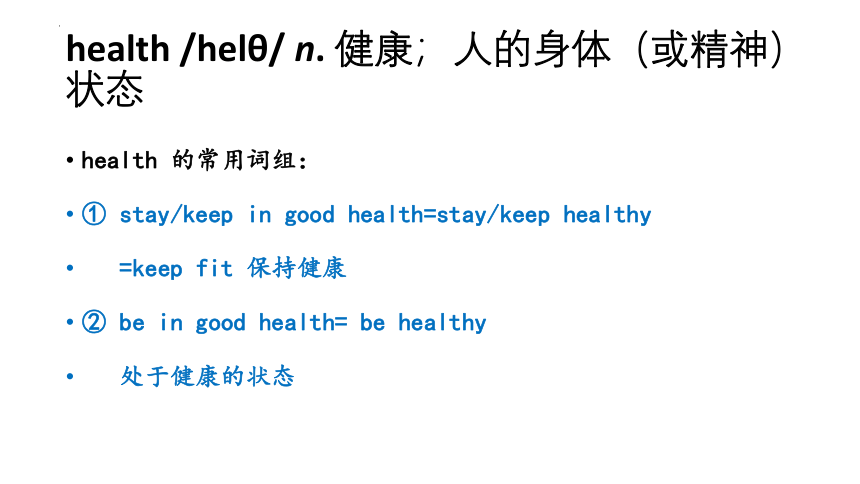
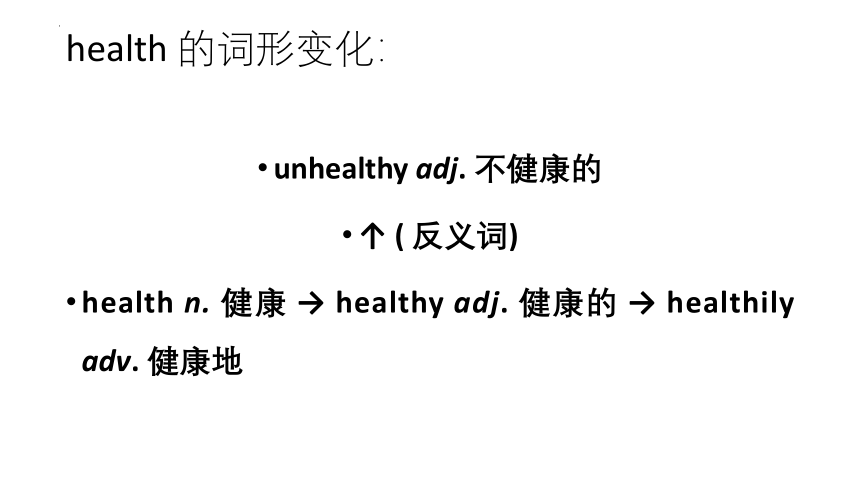
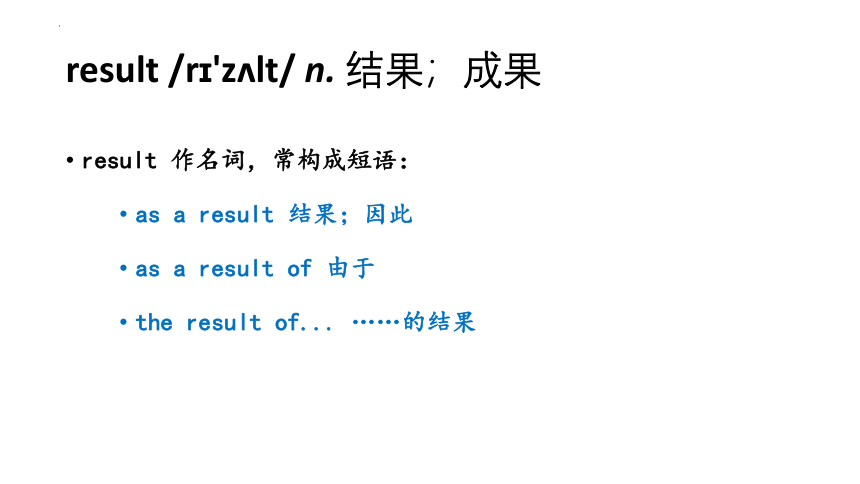
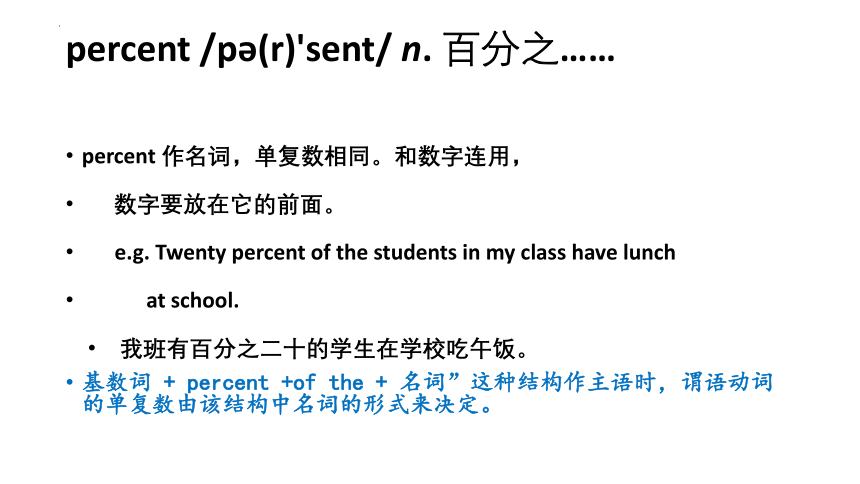
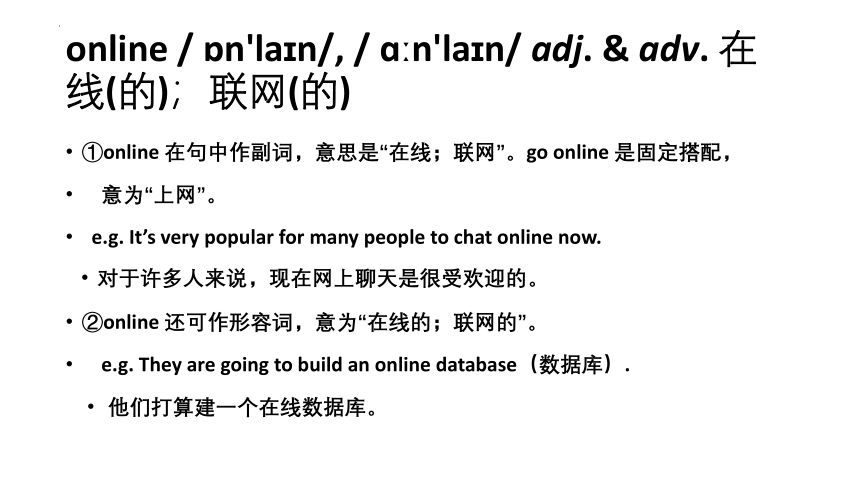

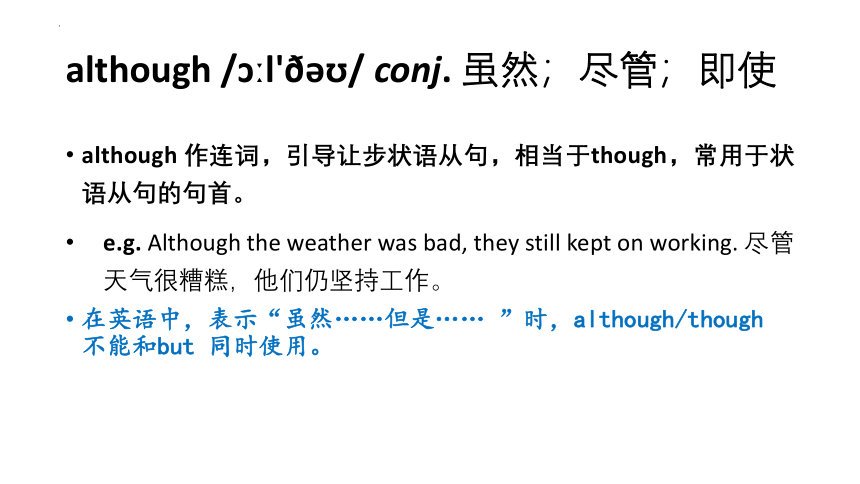
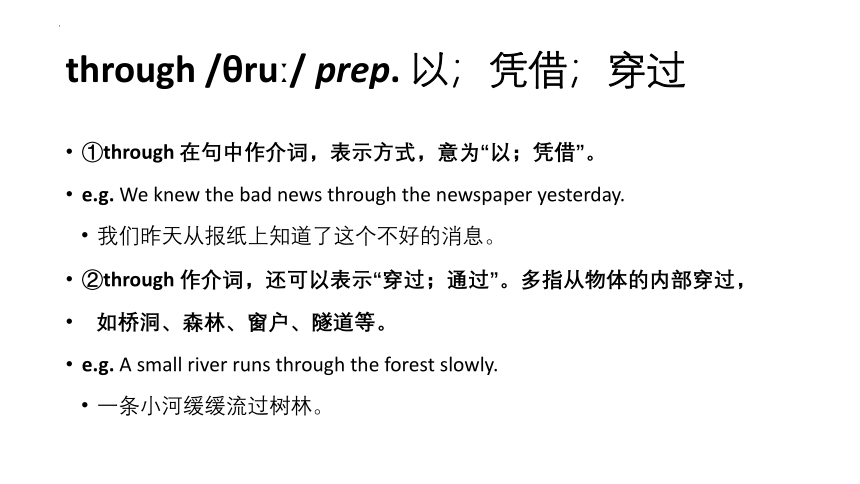
文档简介
(共25张PPT)
人教版英语八年级上册Unit 2 Section B
词汇讲解
health /helθ/ n. 健康;人的身体(或精神)状态
health 的常用词组:
① stay/keep in good health=stay/keep healthy
=keep fit 保持健康
② be in good health= be healthy
处于健康的状态
health 的词形变化:
unhealthy adj. 不健康的
↑ ( 反义词)
health n. 健康 → healthy adj. 健康的 → healthily adv. 健康地
result /r 'z lt/ n. 结果;成果
result 作名词,常构成短语:
as a result 结果;因此
as a result of 由于
the result of... ……的结果
percent /p (r)'sent/ n. 百分之……
percent 作名词,单复数相同。和数字连用,
数字要放在它的前面。
e.g. Twenty percent of the students in my class have lunch
at school.
我班有百分之二十的学生在学校吃午饭。
基数词 + percent +of the + 名词”这种结构作主语时,谓语动词的单复数由该结构中名词的形式来决定。
online / n'la n/, / ɑ n'la n/ adj. & adv. 在线(的);联网(的)
①online 在句中作副词,意思是“在线;联网”。go online 是固定搭配,
意为“上网”。
e.g. It’s very popular for many people to chat online now.
对于许多人来说,现在网上聊天是很受欢迎的。
②online 还可作形容词,意为“在线的;联网的”。
e.g. They are going to build an online database(数据库).
他们打算建一个在线数据库。
关于online的语境记忆
Online (adj .) shopping is cheap and convenient, so many people like shopping online (adv .).
网上购物既便宜又方便,因此许多人喜欢网购。
shop online(adv.)网上购物
although / l' / conj. 虽然;尽管;即使
although 作连词,引导让步状语从句,相当于though,常用于状语从句的句首。
e.g. Although the weather was bad, they still kept on working. 尽管天气很糟糕,他们仍坚持工作。
在英语中,表示“虽然……但是…… ”时,although/though 不能和but 同时使用。
through /θru / prep. 以;凭借;穿过
①through 在句中作介词,表示方式,意为“以;凭借”。
e.g. We knew the bad news through the newspaper yesterday.
我们昨天从报纸上知道了这个不好的消息。
②through 作介词,还可以表示“穿过;通过”。多指从物体的内部穿过,
如桥洞、森林、窗户、隧道等。
e.g. A small river runs through the forest slowly.
一条小河缓缓流过树林。
through, across 与 over的区别
through
指从空间的一头“穿到”另一头,含义与 in 有关。
across
指从一条线或一物体表面的一边“横过”到另一边,
含义与 on 有关。
over
指从某物的上方“越过”。
mind /ma nd/ n. 头脑;心智
①mind 在句中作名词,意思是“头脑;心智”。
e.g. When you are in exams, you should keep a clear mind.
你在考试的时候应当保持清醒的头脑。
②mind 作名词,还可以表示“富有才智的人;记忆力”。
e.g. Madame Curie was one of the greatest minds in her time.
居里夫人是她那个时代最聪慧的人之一。
mind 作名词的常用搭配
① change one’s mind 改变某人的主意
② make up one’s mind 下决心
③ in one’s mind 在某人看来
④ have/keep ... in mind 记住……
such as 例如
e.g. He does well in many subjects, such as Chinese, math and science.
他很多学科都学得不错,例如语文、数学和科学。
I’d like to keep a pet, for example, a cat.
我想养个宠物,例如一只猫。
such as 与 for example的区别
such as
通常用来列举同类人或事物中的几个例子,前面一般用逗号隔开。
for example
用来列举某一论点或情况,一般只列举同类人或事物中的一个,在句中作插入语。可置于句首、句中或句末。位于句中时,常用逗号与前后隔开。
die /da / v. 消失;灭亡;死亡
die 常用作不及物动词,其后不能直接跟宾语。die 还可作短暂性动词,不能和表示一段时间的状语连用。如果与表示一段时间的状语连用,则使用表示状态的形容词dead。
与die 相关的词:
death n. 死亡 ← die → dead adj. 死的
dying adj. 垂死的
↘
语境串记:die, dead, death, dying
His father has been dead for six days. He died from a car accident. His death made his family so sad that they always can’t help thinking of his dying look.
他的父亲去世六天了。他死于一场车祸。他的去世让家人非常伤心以至于他们总是禁不住想起他临终时的样子。
dentist /'dent st / n. 牙科医生
go to the dentist=see a dentist 去看牙医
在英语中,表示职业的名词后面加-’s,可以表示地点。
go to the doctor’s 去看医生
go to the teacher’s 去老师办公室
go to the barber’s 去理发店
however /ha 'ev (r)/ adv. 然而;不过
however 与but 的区别:
(1) 从语义上看,but 所表示的是对事的对比,转折意味较however 强;
(2) 从语序上看,but 总是位于所引出的分句之首,而however 可位于句首、句中或句末;
habit /'h b t/ n. 习惯;习性
habit 构成的常见短语:
① eating habits 饮食习惯
② get into the habit of... 养成……的习惯
③ break the habit of ... 摒弃……的习惯
almost /' lm st/ adv. 几乎;差不多
e.g. He almost ate all the bread in the restaurant.
他几乎吃了餐馆里所有的面包。
Almost nobody believed her. 几乎没有人相信她。
特别提醒:almost 不能与not 连用,但可与 no,none, nobody,nothing,never 等否定词连用。
almost是常用的程度副词,同义词是nearly。
almost 常常位于行为动词之前,系动词、情态动词和助动词之后。
none /n n/ pron. 没有一个;毫无
none 与no one
none
意为“ 没有一个;毫无”,既可以指人也可以指物
通常和of 短语连用,作主语时谓语动词既可以用单数也可以用复数,常用来回答how many 或how much 引导的特殊疑问句
no one
意为“ 没有人”, 只能指人
不能与of 短语连用,作主语时谓语动词只能用单数,常用来回答who 引导的特殊疑问句
point /p nt/ n. 得分点 v. 指;指向
point 作名词讲,意为“得分”,通常指考试、比赛、智力测试中的分数。另外,point 还可以表示“点”。
e.g. He got nine points in the test. 在测试中他得了九分。
Don’t write down everything, just the main points.
不要把所有的东西都记下来,只记要点。
point /p nt/ n. 得分点 v. 指;指向
point 还可以用作不及物动词,意为“指;指向”。
e.g. “There weren’t any trees on the mountain ten years ago,” he pointed to the mountain and said.
“十年前山上没有树。”他指着大山说道。
Can you point out the mistakes in my homework
你能指出我作业中的错误吗
point 作动词,常用短语:
① point to 指向……(远处的人或物)
② point at 指着……(近处的人或物)
③ point out 指出……(缺点、优点或错误)
谢谢观看
Thank you for watching!
人教版英语八年级上册Unit 2 Section B
词汇讲解
health /helθ/ n. 健康;人的身体(或精神)状态
health 的常用词组:
① stay/keep in good health=stay/keep healthy
=keep fit 保持健康
② be in good health= be healthy
处于健康的状态
health 的词形变化:
unhealthy adj. 不健康的
↑ ( 反义词)
health n. 健康 → healthy adj. 健康的 → healthily adv. 健康地
result /r 'z lt/ n. 结果;成果
result 作名词,常构成短语:
as a result 结果;因此
as a result of 由于
the result of... ……的结果
percent /p (r)'sent/ n. 百分之……
percent 作名词,单复数相同。和数字连用,
数字要放在它的前面。
e.g. Twenty percent of the students in my class have lunch
at school.
我班有百分之二十的学生在学校吃午饭。
基数词 + percent +of the + 名词”这种结构作主语时,谓语动词的单复数由该结构中名词的形式来决定。
online / n'la n/, / ɑ n'la n/ adj. & adv. 在线(的);联网(的)
①online 在句中作副词,意思是“在线;联网”。go online 是固定搭配,
意为“上网”。
e.g. It’s very popular for many people to chat online now.
对于许多人来说,现在网上聊天是很受欢迎的。
②online 还可作形容词,意为“在线的;联网的”。
e.g. They are going to build an online database(数据库).
他们打算建一个在线数据库。
关于online的语境记忆
Online (adj .) shopping is cheap and convenient, so many people like shopping online (adv .).
网上购物既便宜又方便,因此许多人喜欢网购。
shop online(adv.)网上购物
although / l' / conj. 虽然;尽管;即使
although 作连词,引导让步状语从句,相当于though,常用于状语从句的句首。
e.g. Although the weather was bad, they still kept on working. 尽管天气很糟糕,他们仍坚持工作。
在英语中,表示“虽然……但是…… ”时,although/though 不能和but 同时使用。
through /θru / prep. 以;凭借;穿过
①through 在句中作介词,表示方式,意为“以;凭借”。
e.g. We knew the bad news through the newspaper yesterday.
我们昨天从报纸上知道了这个不好的消息。
②through 作介词,还可以表示“穿过;通过”。多指从物体的内部穿过,
如桥洞、森林、窗户、隧道等。
e.g. A small river runs through the forest slowly.
一条小河缓缓流过树林。
through, across 与 over的区别
through
指从空间的一头“穿到”另一头,含义与 in 有关。
across
指从一条线或一物体表面的一边“横过”到另一边,
含义与 on 有关。
over
指从某物的上方“越过”。
mind /ma nd/ n. 头脑;心智
①mind 在句中作名词,意思是“头脑;心智”。
e.g. When you are in exams, you should keep a clear mind.
你在考试的时候应当保持清醒的头脑。
②mind 作名词,还可以表示“富有才智的人;记忆力”。
e.g. Madame Curie was one of the greatest minds in her time.
居里夫人是她那个时代最聪慧的人之一。
mind 作名词的常用搭配
① change one’s mind 改变某人的主意
② make up one’s mind 下决心
③ in one’s mind 在某人看来
④ have/keep ... in mind 记住……
such as 例如
e.g. He does well in many subjects, such as Chinese, math and science.
他很多学科都学得不错,例如语文、数学和科学。
I’d like to keep a pet, for example, a cat.
我想养个宠物,例如一只猫。
such as 与 for example的区别
such as
通常用来列举同类人或事物中的几个例子,前面一般用逗号隔开。
for example
用来列举某一论点或情况,一般只列举同类人或事物中的一个,在句中作插入语。可置于句首、句中或句末。位于句中时,常用逗号与前后隔开。
die /da / v. 消失;灭亡;死亡
die 常用作不及物动词,其后不能直接跟宾语。die 还可作短暂性动词,不能和表示一段时间的状语连用。如果与表示一段时间的状语连用,则使用表示状态的形容词dead。
与die 相关的词:
death n. 死亡 ← die → dead adj. 死的
dying adj. 垂死的
↘
语境串记:die, dead, death, dying
His father has been dead for six days. He died from a car accident. His death made his family so sad that they always can’t help thinking of his dying look.
他的父亲去世六天了。他死于一场车祸。他的去世让家人非常伤心以至于他们总是禁不住想起他临终时的样子。
dentist /'dent st / n. 牙科医生
go to the dentist=see a dentist 去看牙医
在英语中,表示职业的名词后面加-’s,可以表示地点。
go to the doctor’s 去看医生
go to the teacher’s 去老师办公室
go to the barber’s 去理发店
however /ha 'ev (r)/ adv. 然而;不过
however 与but 的区别:
(1) 从语义上看,but 所表示的是对事的对比,转折意味较however 强;
(2) 从语序上看,but 总是位于所引出的分句之首,而however 可位于句首、句中或句末;
habit /'h b t/ n. 习惯;习性
habit 构成的常见短语:
① eating habits 饮食习惯
② get into the habit of... 养成……的习惯
③ break the habit of ... 摒弃……的习惯
almost /' lm st/ adv. 几乎;差不多
e.g. He almost ate all the bread in the restaurant.
他几乎吃了餐馆里所有的面包。
Almost nobody believed her. 几乎没有人相信她。
特别提醒:almost 不能与not 连用,但可与 no,none, nobody,nothing,never 等否定词连用。
almost是常用的程度副词,同义词是nearly。
almost 常常位于行为动词之前,系动词、情态动词和助动词之后。
none /n n/ pron. 没有一个;毫无
none 与no one
none
意为“ 没有一个;毫无”,既可以指人也可以指物
通常和of 短语连用,作主语时谓语动词既可以用单数也可以用复数,常用来回答how many 或how much 引导的特殊疑问句
no one
意为“ 没有人”, 只能指人
不能与of 短语连用,作主语时谓语动词只能用单数,常用来回答who 引导的特殊疑问句
point /p nt/ n. 得分点 v. 指;指向
point 作名词讲,意为“得分”,通常指考试、比赛、智力测试中的分数。另外,point 还可以表示“点”。
e.g. He got nine points in the test. 在测试中他得了九分。
Don’t write down everything, just the main points.
不要把所有的东西都记下来,只记要点。
point /p nt/ n. 得分点 v. 指;指向
point 还可以用作不及物动词,意为“指;指向”。
e.g. “There weren’t any trees on the mountain ten years ago,” he pointed to the mountain and said.
“十年前山上没有树。”他指着大山说道。
Can you point out the mistakes in my homework
你能指出我作业中的错误吗
point 作动词,常用短语:
① point to 指向……(远处的人或物)
② point at 指着……(近处的人或物)
③ point out 指出……(缺点、优点或错误)
谢谢观看
Thank you for watching!
同课章节目录
- Unit 1 Where did you go on vacation?
- Section A
- Section B
- Unit 2 How often do you exercise?
- Section A
- Section B
- Unit 3 I'm more outgoing than my sister.
- Section A
- Section B
- Unit 4 What's the best movie theater?
- Section A
- Section B
- Unit 5 Do you want to watch a game show?
- Section A
- Section B
- Unit 6 I'm going to study computer science.
- Section A
- Section B
- Unit 7 Will people have robots?
- Section A
- Section B
- Unit 8 How do you make a banana milk shake?
- Section A
- Section B
- Unit 9 Can you come to my party?
- Section A
- Section B
- Unit 10 If you go to the party, you'll have a grea
- Section A
- Section B
